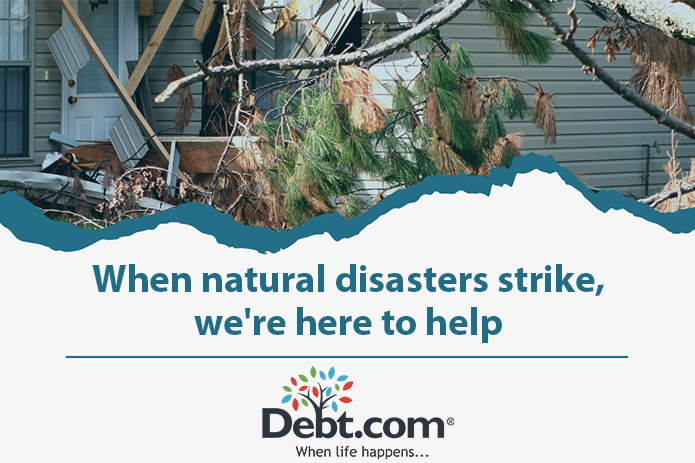Debt.com Provides Essential Financial Guidance for Victims of Hurricanes Helene and Milton
FORT LAUDERDALE, FL , October 15, 2024 /Noticias Newswire/ – In the wake of Hurricanes Helene and Milton, countless families are grappling not only with the physical destruction of their homes and properties but also with severe financial setbacks. Debt.com, a trusted leader in financial education and debt relief, is extending its support to help …
FORT LAUDERDALE, FL , October 15, 2024 /Noticias Newswire/ – In the wake of Hurricanes Helene and Milton, countless families are grappling not only with the physical destruction of their homes and properties but also with severe financial setbacks. Debt.com, a trusted leader in financial education and debt relief, is extending its support to help those affected by the storms manage the financial fallout and rebuild their economic stability.
Debt.com is providing free resources, financial counseling, and expert advice specifically tailored for hurricane victims. These services aim to help affected individuals explore their options, recover more quickly, and rebuild stronger financial foundations. The organization has also compiled a list of personal finance tips and links to government assistance programs to assist during this critical time.
Personal Finance Tips for Hurricane Victims
- Document All Damage and Expenses: Keep detailed records of storm damage, repairs, and temporary living expenses. This will be crucial for insurance claims and any potential assistance from FEMA.
- Contact Your Insurance Provider First: Call your insurance company to understand what’s covered and how to file a claim. Homeowners, renters, and auto insurance policies may all have provisions for storm damage.
- Reach Out for Help if You Can’t Pay Your Bills: Many creditors and utility companies offer temporary payment relief in times of disaster. Contact your lenders and service providers to ask about deferment options and waived fees.
- Be Cautious When Using Credit: If you have to use credit cards to cover emergency expenses, be strategic. Use the card with the lowest interest rate and prioritize paying off those balances as soon as possible.
- Create an Emergency Budget: If your income has been disrupted or you’re facing higher expenses, build a temporary budget that prioritizes essentials like housing, food, and medical care. Cut back on non-essentials until you have a clearer picture of your financial situation.
- Avoid High-Cost Loans and Scams: After natural disasters, scammers often target victims with high-interest loans or fraudulent services. Stick to reputable sources of assistance and avoid payday loans or predatory lending.
- Seek Professional Advice: If you’re feeling overwhelmed by your financial situation, reach out to Debt.com for a free consultation. They can help you develop a recovery plan and provide guidance on managing debt.
Government Resources Available for Hurricane Victims
- Federal Emergency Management Agency (FEMA): FEMA provides financial assistance for temporary housing, home repairs, and other disaster-related expenses. Visit www.disasterassistance.gov or call 1-800-621-FEMA (3362) for help.
- Small Business Administration (SBA) Disaster Loans: The SBA offers low-interest disaster loans to homeowners, renters, and businesses to help cover losses not fully covered by insurance. Visit www.sba.gov or call 1-800-659-2955 for details.
- American Red Cross: The Red Cross provides emergency shelter, food, and financial assistance. Visit www.redcross.org or call 1-800-RED-CROSS (733-2767).
- Department of Housing and Urban Development (HUD) Disaster Resources: HUD offers foreclosure relief and other housing assistance for those in disaster areas. Contact a HUD-approved housing counselor at 1-800-569-4287 or visit www.hud.gov.
- State and Local Emergency Management Agencies: Many states and counties have additional resources and recovery programs for disaster victims. Check your state or local emergency management website for specific help.
Rebuilding takes time, but you don’t have to go through it alone. Debt.com encourages anyone struggling financially after Hurricanes Helene and Milton to seek help before debt becomes unmanageable.
For personalized advice or to schedule a free counseling session, visit www.debt.com.





